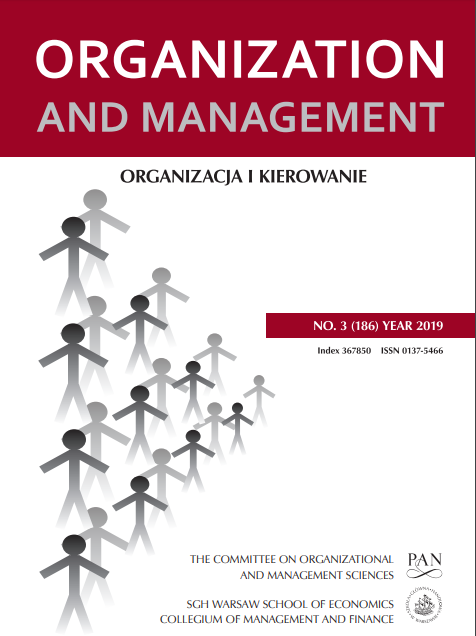Flexibility And Efficiency In The Applied Management Style On The Example Of Managers In The Banking Sector Abstract
Main Article Content
Abstract
Each organization needs managers who will efficiently manage their employees. Efficiency is a condition necessary to achieve a competitive advantage. An efficient manager can adjust his management style to the existing situation and the environment. The manager must think first of all about what needs to be done so that the organization can meet the current and future needs of the changing market. The aim of this article is to analyze the flexible selection of the management style by managers and to connect it with efficiency in the applied management style. On the basis of qualitative research conducted among 188 managers, the author positively verifies the hypotheses which assume that firstly, managers in the banking sector are characterized by flexibility in applying the management style and secondly, the greater the flexibility in using management styles, the higher the subjective assessment of the efficiency of managing people. Nevertheless, both variables (flexibility and efficiency) are at a high level, which may be due to the specifics of the sector under study.
Article Details
References
University of Economics in Poznań, Poznań.
[2] Brzezińska U., Rafalak M. [2015], WERK Inwentarz Stylów Kierowania Ludźmi, Laboratory
of Psychological Tests of the Polish Psychological Association, Warsaw.
[3] Drucker P.F. [2017], Menedżer skuteczny, MT Biznes, Warsaw.
[4] Grzywiński M. [2012], Elastyczny szef, Personel i Zarządzanie 11(272).
[5] Guest D.E. [1997], Human resource management and performance: A review and research
agenda, International Journal of Human Resource Management 8.
[6] Juchnowicz M., Wojtczuk-Turek A. [2007], Istota elastycznego zarządzania kapitałem
ludzkim, in: M. Juchnowicz (ed.), Elastyczne zarządzanie kapitałem ludzkim w organizacji
wiedzy, Difin, Warsaw.
[7] Ketkar S., Sett P.K. [2009], HR flexibility and firm performance: Analysis of a multi-level
causal model, International Journal of Human Resource Management 20.
[8] Ketkar S., Sett P.K. [2010], Environmental dynamism, human resource flexibility and
firm performance: Analysis of a multi-level causal model, International Journal of Human
Resource Menagement 22.
[9] Kotarbiński T. [1982], Traktat o dobrej robocie, OSSOLINEUM, Warsaw.
[10] Kowal W. [2013], Skuteczność i efektywność – zróżnicowane aspekty interpretacji,
Organizacja i Kierowanie 4(157).
[11] Król M. [2014], Elastyczność zatrudnienia w organizacji, CeDeWu, Warsaw.
[12] Krupski R. [2008], Elastyczność organizacji, University of Economics in Wrocław, Wrocław.
[13] Leeuw A.C.J., Volberda H.W. [1996], On the concept of flexibility. A dual control
perspective, OMEGA – International Journal of Management Science 2.
[14] Majewska M., Samol S. [2016], Rozwój elastycznego rynku pracy, UAM, Poznań.
[15] Mingotaud F. [1994], Sprawny kierownik, Poltext, Warsaw.
[16] Ngo H., Loi R., Foley S. [2011], Human resource flexibility in foreign subsidiaries: An
empirical investigation in Hong Kong, International Journal of Business Studies 19,
December, http://crm.sem.tsinghua.edu.cn/UploadFiles/File/1(4).pdf (access: 07.07.2019).
[17] Pathak R.C. [2005], Flexibility – thinking shift for organizational excellence, Global
Journal of Flexible Systems Management 6.
[18] Peper B., Doorne-Huiskes A. van, Dulk L. den (eds.) [2005], Flexible working and
organizational change. The integration of work and personal life, Edward Elgar, CheltenhamNorthampton.
[19] Prahaland C.K., Krishnan M.S. [2001], Nowa era innowacji, PWN, Warsaw
[20] Pszczołowski T. [1977], Celowość, skuteczność i efektywność, Prakseologia 3(63).
[21] Pszczołowski T. [1978], Mała encyklopedia prakseologii i teorii organizacji, OSSOLINEUM, Warsaw.
[22] Stoner J.A.F., Freeman R.E., Gilbert D.R. [2001], Kierowanie, PWE, Warsaw.
[23] Zieleniewski J. [1969], Organizacja i zarządzanie, PWN, Warsaw.
[24] Zieleniewski J. [1982], Organizacja zespołów ludzkich. Wstęp do teorii organizacji i kierowania, PWN, Warsaw.
